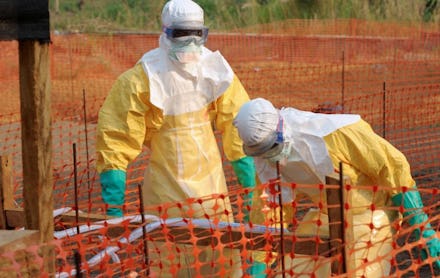The Deadliest Ebola Outbreak in History is Happening Right Now — And It's Getting Worse

The news: Since March, medical professionals in western Africa have been battling a raging Ebola epidemic. Now, it has officially become the most deadly outbreak of the virus ever.
According to the World Health Organization (WHO), the epidemic has so far killed more than 390 people and afflicted more than 600 in Liberia, Sierra Leone and Guinea, where the current outbreak originated. That's deadlier than the virus's first outbreak in 1976 near the Ebola River in the current-day Democratic Republic of Congo which killed 280 people.
Resources are also wearing thin. "The epidemic is out of control," Bart Janssens, the director of operations for Médecins Sans Frontières (the French version of Doctors Without Borders) said in a statement. "We have reached our limits. Despite the human resources and equipment deployed by [Doctors Without Borders] in the three affected countries, we are no longer able to send teams to the new outbreak sites."
Image Credit: The Washington Post
How did the outbreak begin? Guinea's ministry of health first reported 86 cases of Ebola on March 24. Since then, the virus has crossed borders and spread to other countries.
The definitive cause of the outbreak has yet to be confirmed, although authorities suspect that it may have initially started by people eating bats. Fruit bats are considered a delicacy in Guinea despite the fact that they are natural hosts of the Ebola virus. Shortly after the outbreak was first reported, the government banned eating bats to prevent the disease from spreading further.
How is Ebola spreading? The main problem stems from traveling across borders. Because patients infected with Ebola can go for days without exhibiting symptoms, seemingly healthy travelers can bring the disease from another country and pass it around. So far, countries in the infected zone have stepped up travel restrictions and mandatory screenings before flights, but that clearly hasn't been enough.
"What we are seeing is a lot of cross-border movement," Francis Kasolo, WHO's director of disease prevention and control for Africa, told Bloomberg. "When somebody comes in contact with a sick person in Guinea and crosses into Sierra Leone, as long as they don't report having come into contact with an Ebola patient, there is a grave possibility that that person will transmit the disease."
Image Credit: Getty
Why is the virus so contagious? At this point, much of the outbreak has been contained in rural areas with low levels of sanitation. But medical professionals are dealing with a bigger problem than hygiene: misinformation.
That means informing people in Sierra Leone that their tradition of waiting months to bury their dead is dangerous and convincing angry family members that their loved ones have to be quarantined. Distrust of foreign aid workers has become so rampant that people in Sierra Leone and Guinea have even attacked medical centers that are trying to help them.
And it doesn't help that people have taken advantage of the opportunity to peddle fake vaccines, despite the fact that no such immunizations exist for Ebola. For now, medical authorities advise the same methods that have been used for every Ebola outbreak: quarantine, protective gear and public education.